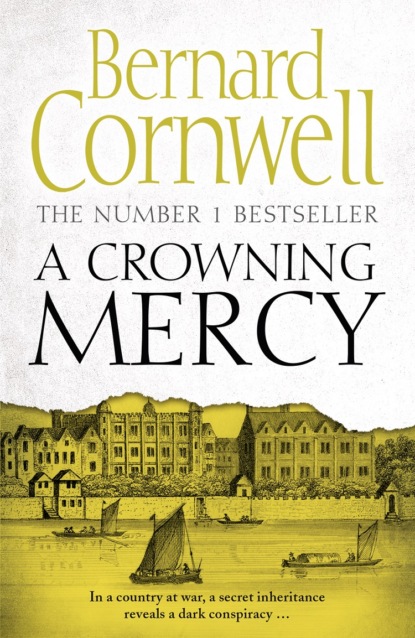По всем вопросам обращайтесь на: info@litportal.ru
(©) 2003-2025.
✖
A Crowning Mercy
Настройки чтения
Размер шрифта
Высота строк
Поля
Campion was nervous. She listened. She could hear the creak of timbers in the old house, she could hear her own breathing, she could hear the far, muffled rumble of Scammell’s snoring.
She was close, she knew she was. She remembered playing hunt-the-thimble with their old cook, Agnes, in the kitchen garden, and Campion knew that at this moment she was warm. Over the years she suddenly heard Agnes’s voice: ‘You’ll burn yourself, child, you’re that close! Look, child! Go on with you!’
She was utterly still, drawn to this room by instincts sharpened by her long immersion in her father’s papers. She imagined him hiding something. What would he have done?
Secret places. Closed up. Then it came to her, so simple, and again she was listening to her father’s voice. He had preached each Sunday to his household in the days before Faithful Unto Death had come to Werlatton parish, and now Campion was remembering one of those sermons. It had been his usual two-hour length, the servants and family expected to be still on the hard benches as he preached, and she remembered the sermon about the secret places of a man’s heart. It was not enough, her father had said, to be an outward Christian, praying much and giving much, because there were secret places in a man’s heart where evil could lurk. It was in those secret places that God looked.
It is like, Matthew Slythe had preached, a strong box. When the lid is open a thief in the night will see only an ordinary chest, but the owner knows that there is a secret layer at the bottom of the chest. God is the owner, and he knows what is in the secret part of each person’s life. Campion remembered the story and turned slowly, knowing that her father drew his stories and examples from his own life.
It would not be this chest but his own, and Campion went soft as the night across the floor, like a thief in the darkness, into the room that was strewn with his clothes, pulled the untidy mess out of the huge wooden chest and made a pile of clothes on the floor.
She searched the bare, wooden box, finding nothing, but always hearing the voice across the years from the kitchen garden. ‘Look, child!’
She tried to lift the chest, but it was impossibly heavy, and she probed at its corners, pushed each knothole in the wood. Nothing moved, nothing gave, yet still she knew she was warm.
In the end it was simple. The base of the chest was surrounded by a thick skirting board of varnished wood which she had tugged and pushed. Then she thought that it might be easier to lift the chest at one end, jam a pair of her father’s great shoes beneath, and thus feel the chest’s base. She shuffled slowly to the right-hand side of the huge chest, moved a pair of her father’s breeches out of the way, and saw something she had missed in the thick darkness of the room. There was a handle cut into the skirting board, presumably to facilitate the lifting of the heavy chest, and she knelt in front of it, gripped the simple handle, and tried once more to lift the chest.
It would not move. It was simply too heavy, but the skirting board moved. Only the smallest fraction, but she knew she had not been deceived, and she hauled on it again, and again she felt the tiny movement.
There was a small window behind her, its wooden shutter open, and she was aware that the sky was lightening. Dawn would come soon.
She frowned, the tiredness heavy on her, as she contemplated the skirting board with its cut-out handle. It had moved, but it revealed nothing, and she tugged it again, knowing the effort to be useless, and trying to think what she should do.
She put her hand into the hole and felt with her fingers at the back of the board. There was something cold there, something made of metal, and her long fingers explored the metal, found a ring, and she tugged on it.
She heard the sound of a bolt sliding open. She froze, half expecting the small sound to bring Goodwife from her room, but the house was still.
Campion’s heart was beating as it did before she went naked into the water.
She gripped the handle again, pulled, and this time the skirting board moved easily, sliding out as the front of a shallow, secret drawer, and then the runners of wood shrilled and she froze again.
She bit her lip, closed her eyes, as if those actions might lessen the noise, and pulled again.
The drawer opened. She had found her father’s secret place and she knelt there, not exploring the contents, waiting to see if anyone in the house stirred.
The first birds were calling outside. Soon, she knew, Werlatton would be busy, and the knowledge made her hurry.
Two bundles were in the drawer. She lifted the first, hearing the clink of money, and she guessed that this had been her father’s secret reserve of cash. Most houses, even the poorest, tried to keep a little money hidden against the bad times. Agnes had told her that her mother had pushed a leather purse of two gold coins into the eave of the thatch, and this heavy bag was Matthew Slythe’s equivalent. She put the purse on to one of his shirts, then lifted out the smaller, lighter package.
Then, holding her breath, she pushed the drawer home. There was no need for anyone to know she had been there. Her fingers found the ring of the bolt, pushed, and the chest looked innocent again.
Somewhere a pail clanged against stone; she heard the creak and groan of the yard pump, and she knew Werlatton was about to wake up. She wrapped the shirt about the two packages, crept from the room, then went on silent feet to her own bedroom.
There were fifty pounds in the purse, more money than most men would ever dream of owning. Fifty golden pounds, each with the head of King James on them, and she looked at the money on her bedroom table and she knew now she could run away. She smiled at the thought that the money which her father had saved against calamity would be used to take her away from Werlatton. Carefully, slowly, she placed the coins back in the purse, putting each heavy piece of gold in separately so that the noise would not alert any of the servants.
The second packet was tied tight with string. She cut the knot with the scissors she used for her sewing, then unwrapped the old, yellow linen that hid her father’s secret.
Inside was a pair of gloves.
She frowned, lifting them, seeing two other things still in the package, and she saw that the gloves were made of lace, delicate and beautiful, fragile as thistledown, and as unlikely in a Puritan’s house as a drunken game of cards would be. They were women’s gloves, made for someone with long, slender hands, and Campion gently pulled one of them on and held her hand out to the window light. The glove was old and yellowed, but still beautiful. At the wrist was a ring of small, sewn pearls. Sheathed in the lace glove, it seemed to her that her hand belonged to someone else. She had never worn anything beautiful, anything pretty, and she stared at her lace-covered hand and smiled at the effect. She could not understand why something so lovely should be described as sinful.
She carefully pulled the glove off, folding it on its partner, and picked up the second object. This was a piece of parchment, its folds crackling and stiff, and she feared that the paper might break as she opened it. It was a letter, written in an ornate and bold hand, and she sat on her window-seat to read it.
‘You have been sent the Jewell by the Jewe, tell mee if this bee not so. Thou knowest its importance. I have long worked for this, and its power bee in your disposall at least till the girl be of twenty-five years. The Covenant is secure if the jewell bee secure.
‘It is important that you sende an impression of the Seale to the name I furnished you with, and I doe earnestlie require that you Marke the Seale in a Privatt way that wee bee not undone by counterfeiting. Wee have not seen the Seales of Aretine and Lopez, though they have seen oures, and this device of a Secrett Marke I have made a parte of oure Agreement. Doe not fail mee in this.
‘Guard the Jewell well. It is the key to great Wealth, and though the Other Seales are needed too, you may bee sure that One Day this Jewell will bee much sought.
‘The Gloves are of the Prescott Girl. You may have them.
‘Guard the Jewell.’
It was signed Grenville Cony.
Cony, Covenant. She read the letter again. ‘Till the girl be of twenty-five years’ must, she knew, refer to herself. Isaac Blood had said that the monies of the Covenant would be hers at twenty-five, unless she was married. ‘The Prescott Girl’ had to be her own mother, Martha Slythe, whose maiden name had been Prescott, but Campion could not imagine her fat, bitter mother ever owning lace gloves. She picked up one of the gloves, seeing the pearls hanging at its wrist, and she wondered by what mystery her mother had owned them.
The letter raised more mysteries than it solved. ‘Aretine and Lopez’, whoever they were, were names that meant nothing to Campion. ‘You may bee sure that One Day this Jewell will be much sought.’ That had come true. Ebenezer and Scammell had ransacked the house, the strange man had come from London and thrust his leg between hers, and all for the last object in the packet.
Grenville Cony, in his letter, had described the seal as a jewel. She lifted it, marvelling at its weight. The jewel was made of gold, suspended from a gold chain so it could be worn as a necklace, and Campion, brought up in the rigours of her father’s religion, had never seen an object so beautiful.
It was a cylinder of gold, banded by tiny, glowing stones that were white like stars and red like fire. The whole pendant was the size of her thumb.
On its base was the seal, duller than the gold of its setting, and she guessed it was made of steel. It had been cut by a craftsman who had made the seal into a work of art, as beautiful as the gold jewel itself.
Light was flooding the cornfields, touching grey silver on the bend in the stream far to the north, and Campion held the seal up to the dawn light from her window.
The rim of the seal was chased with an ornate design. In the centre was an axe, short handled and wide bladed, and on either side of the axe’s handle were small letters in mirror-writing: ‘St Matt’.
This was the Seal of St Matthew, showing the axe which legend said had cut off the disciple’s head.
She fingered the heavy gold, wondering at it, looking at it in her hands when, just as the skirting board had moved, so now the seal seemed to give in her fingers. She frowned, tried to repeat what she had just done, and realised that the seal was in two halves, the joint concealed cunningly by one band of the precious stones. She unscrewed the two halves.
The half of the cylinder which bore the Seal of St Matthew fell away in her right hand. She lifted the other half into the light. The jewel, on its long golden chain, held a secret.
There was a tiny carving inside the cylinder, a carving that had been made with exquisite skill and cast in silver so that the gold cylinder enclosed a tiny silver statue. The statue shocked her. It was a symbol of such ancient power, a symbol of all that she had been taught to hate, and it had been in this house. Her father would have abominated this, yet he had kept it, and Campion stared at it, fascinated and repelled. It was a crucifix.
A crucifix of silver in a cylinder of gold, a seal made into a jewel, the key to great wealth. She looked at the letter again, noting once more the urgent appeal for Matthew Slythe to mark the seal. She lifted the jewel into the light and saw that her father had scratched a line across the face of the axe-blade. To stop counterfeiting, the letter said, but who was the man to whom the impression had to be sent? Who was Aretine? Lopez? Her discovery of the seal had uncovered new mysteries and she knew the answers did not lie in Werlatton.
The answers would be in London. The letter was signed Grenville Cony, and beneath his signature he had written, simply, ‘London’.
London. She had never seen a town, let alone a city. She was not even sure which was the road that led from Werlatton towards London.
Grenville Cony was in London, whoever he was, and Toby Lazender was certainly in London, and Campion looked at her table and saw the heavy, leather purse with her father’s hoard of gold. That could take her to London! She gripped the jewel in her hands, stared at the flooding of the summer light into the valley, and she felt the excitement rise within her. She would run away, away from Ebenezer and Scammell, from Goodwife and Werlatton, from all the people who wanted to crush her and make her into what she was not. She would go to London.
PART TWO (#ulink_f40cb9c8-8af1-5b77-8654-4d454c71f091)
The Seal of St Mark (#ulink_f40cb9c8-8af1-5b77-8654-4d454c71f091)











